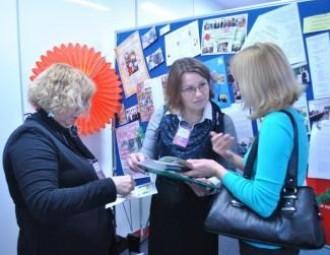Is informal education affordable in Belarus?

How affordable is informal education in Belarus from the financial point of view? Is it available for all age groups? And what about affordability that depends on the place of residence?
“Informal education for all generations” was the topic of a talk-show and the subject of the IFE Festival itself this year.
The questions of geographical, financial and age availability of informal education (IFE) have become the central topic of the talk-show at the fourth Festival of informal education that takes place on December, 7-9 in Minsk.
Theoretically IFE in Belarus should be available for every person of any age regardless of the place of residence. But we cannot state that IFE in our country is available for all categories of citizens, said the head of the Representative Office of the German Adult Education Association «Deutscher Volkshochschul-Verband e.V.» in Belarus Galina Verameichyk.
During the last years the IFE market is rapidly developing, and today one can find lots of commercial offers of different courses, trainings and so on. But as a rule, all these educational programs take place in Minsk, regional centres or big cities. To get extra education locally is almost impossible for the rural population, only if it is distant learning. “The farther from the capital and regional centres, the less opportunities Belarusans have to participate in the process of informal education”, - drew up poor results Galina Verameichyk.
The affordability of the IFE service is largely restricted, agreed Vitaut Rudnick, the president of the Centre for Informational Support of Public Initiatives "The Third Sector" (Hrodna). He believes that Belarus should change its legal position and attitude towards UFE. He recalled that all over the world up to 50% of the IFE service is provided by the public organizations. And about 2,5 thousand of public organizations available in Belarus are not enough.
Educational programs of “The Third Sector” are in demand among people of all ages. The youth attends the Young Journalist School. Senior citizens are studying in the University of Golden Age, where they can visit 16 different sections for only 3 euro per month. It is all available for them.
The head of the Institute of Lifelong Education of Belarusian State University (BSU) Tatsiana Milava took notice that nowadays educational services are more available for the people of young age – schoolchildren, students. But the people of older generation are not left behind. Tatsiana Milava gave an example when the 85 year old listener has graduated from the Institute of Lifelong Education of BSU; at the same time this educational institution are attending children of 12-13 years, who are studying on the programme preparing them to school Olympiads.
Price factor in informal education was mentioned by the director of the LLC Couch Centre “Square Orange” Vasil Pron. He noted that not all Belarusans can afford themselves extra education and explained why commercial organizations are often involved in business-education for adults: “These services are more asked-for by the middle class –wealthier people who need new knowledge and competence in order to move our economy forward”.
The representative of the educational centre “Leader” explained that his centre would be ready to work in other towns, but only if there is financially solvent demand. He said that the cost of the courses in “Leader” is 400 thousand roubles (about 45 euro) a month, and “with such price it would be very difficult to form a language group in small Belarusan town”.
But does everything hinge on the money-issue? On the one hand, yes: someone simply cannot afford himself extra education. But people are often not ready to attend even free courses.
The problem of IFE is first of all the problem of motivating people, assumes the Deputy Chair of the Labour, Employment and Social Protection Committee of the executive committee of the Brest Region Uladzimir Khromau. According to him, the motivation for extra education is higher within the working people: “They are made to do it by their job itself; they understand that in order to remain successful they have to improve their professional skills as well. From this point of view the motivation to get IFE that pensioners have is much lower”.
The question was asked about what practical benefit could elderly people get from attending IFE courses (the perspective of getting a new job was meant).
Vitaut Rudnick said that studying in the University of Golden Age is viewed as improvement of the quality of life of the elderly. “Their motives are different – they are of social, cultural character. They need to overcome social isolation, to find new friends. Only few of them return to the labour market after learning new business-planning or computer mastering. But in the majority of cases they study computer for better communication with their children and grandchildren. They learn foreign language aiming not only at work but rather at memory training”.
The voting of the participants of the festival held at the end of the talk-show showed that a little bit less than half of the audience believed UFE to be financially available in Belarus; almost no one believed it to be geographically available. But the voters assumed that extra education is available for Belarusans regardless of their age.
How can we increase the interest towards IFE and to motivate people? The experts think we need to promote IFE opportunities wider as well as inform about different educational services and broaden the network of the educational services themselves. State-run legal assistance to public organizations involved in IFE will further the IFE development. The positive image of IFE as an occupation for successful people should be formed as well. And of course, we need to see to the availability of IFE in the field. Here public–private partnership, where local administration provides framework conditions and public organizations provide educational service, plays an important role.







-
03.01
-
07.10
-
22.09
-
17.08
-
12.08
-
30.09



























